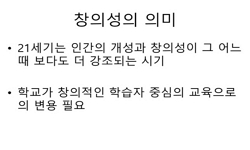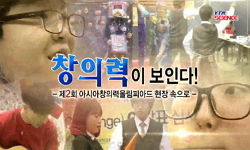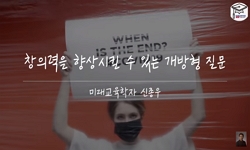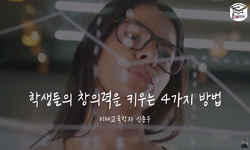This study has been established to review and comprehensively analyze the creativity studies with the doctoral theses performed during the years of 2001 - 2012 in Korea. The doctoral theses which used 'creativity' as topic of the study were selected ...
http://chineseinput.net/에서 pinyin(병음)방식으로 중국어를 변환할 수 있습니다.
변환된 중국어를 복사하여 사용하시면 됩니다.
- 中文 을 입력하시려면 zhongwen을 입력하시고 space를누르시면됩니다.
- 北京 을 입력하시려면 beijing을 입력하시고 space를 누르시면 됩니다.

2001-2012년 창의력관련 연구의 통합적 분석 = An Intergrative Analysis of the Creativity Researches Performed During 2001-2012
한글로보기https://www.riss.kr/link?id=A104782409
- 저자
- 발행기관
- 학술지명
- 권호사항
-
발행연도
2013
-
작성언어
Korean
-
주제어
Creativity ; Meta-analysis ; Integrative analysis ; Doctoral theses ; 창의력 ; 창의성 ; 메타분석 ; 통합적 분석 ; 박사학위 논문
-
등재정보
KCI등재후보
-
자료형태
학술저널
- 발행기관 URL
-
수록면
1-26(26쪽)
-
KCI 피인용횟수
17
- 제공처
-
0
상세조회 -
0
다운로드
부가정보
다국어 초록 (Multilingual Abstract)
This study has been established to review and comprehensively analyze the creativity studies with the doctoral theses performed during the years of 2001 - 2012 in Korea. The doctoral theses which used 'creativity' as topic of the study were selected to make 196 in all. Further, these 60 theses among them which had been designed to test the effectiveness of the creativity programs/packages were analyzed with meta-analysis statistical technique. Major conclusions drawn include: (i) creativity researches had been relatively actively performed with very diverse topics to be 3.47% of the total doctoral theses in education field. Among them, the studies to develop and test the effectiveness of the creativity education/development programs were most frequently investigated. (ii) In test/scale development studies category, creative personality tests, creativity tests in diverse curricular domains and identification tests had been targeted most. And, though very diverse tests/scales had been used in the these studies, TTCT were most frequently employed. (iii) In the correlational studies category, the most often investigated variables were creative personality and then intelligence, self-efficacy and teaching-learning methods were followed in the order. (iv) The creativity education/development programs developed had employed the theoretical rationale such as CPS or its revised version, different arts activities, media use and reading, thinking instructions and cognitive packages, and all of them were found very useful, and (v) these education/development programs were found very effective with ES = 1.08 in all. The general characteristics of these detailed conclusions and their implications have been discussed.
국문 초록 (Abstract)
본 연구는 2001. 1 ~ 2012. 8월 사이에 출판된 국내의 박사학위 논문들 가운데 창의력(창의성)을 토픽으로 하고 있는 196편을 대상으로 하여, 이들 연구들의 유형과 각 유형별 내용을 전체적으로 ...
본 연구는 2001. 1 ~ 2012. 8월 사이에 출판된 국내의 박사학위 논문들 가운데 창의력(창의성)을 토픽으로 하고 있는 196편을 대상으로 하여, 이들 연구들의 유형과 각 유형별 내용을 전체적으로 정리하고 통합적으로 분석해 보았다. 그리고 이들 가운데 창의력 교육/개발 프로그램을 개발하여 효과검증하고 있는 60편에 대하여서는 별도로 메타분석의 통계적 기법을 적용하여 효과의 크기를 확인해 보았다. 주요한 결론들을 보면 (ⅰ) 창의력 관련의 연구들은 전체 교육계열 박사학위 논문의 3.47%로서 비교적 다양하게 그리고 활발하게 이루어지고 있으며, 그리고 특히 실험/효과검증 연구의 비중이 높았고, (ⅱ) 척도개발 연구에서는 창의적 성격 검사, 교과목별 창의력 검사와 판별검사들의 개발이 많았고, 그리고 연구에서 사용하고 있는 검사/척도들 가운데는 TTCT 검사가 가장 빈도가 높은 것이지만 그럼에도 불구하고 검사의 종류는 매우 다양하였다. (ⅲ) 상관관계를 다룬 연구들은 창의적 성격들 간의 관계를 많이 다루었고 그 다음은 지능, 자기 효능감 및 교수-학습 방법 등이었고, (ⅳ) 창의력 교육/개발 프로그램들이 사용하고 있는 이론적 근거로는 CPS와 이의 수정본, 각종의 예술 활동, 매체와 독서, 사고력 수업과 기존의 인지 프로그램 페키지들이 였으며, 그리고 (V) 개발하여 검증하고 있는 이들 교육/개발 프로그램들은 ES=1.08로서 창의적인 문제해결력의 개발에 매우 효과적이었음을 발견할 수 있었다. 그리고 이러한 여러 결론들이 가지고 있는 특징과 이에 수반하는 과제들을 같이 논의해 보았다.
참고문헌 (Reference)
1 김영채, "한국판 TTCT 검사요강" 창의력 한국 FPSP 2010
2 강현숙, "한국 창의성 연구의 조망 : 메타분석을 중심으로" 전북대학교 대학원 2012
3 이영덕, "표준화 간편 창의성 검사 실시요강" 코리안테스팅 센터 1995
4 이정규, "최근 창의성 측정에 대한 논쟁과 발전방향" 한국영재교육학회 5 (5): 151-166, 2006
5 신문승, "초등학교 창의성교육 프로그램의 효과에 관한 메타분석" 한국초등교육학회 22 (22): 113-135, 2009
6 신문승, "초등학교 아동 창의성 계발 프로그램의 효과 메타분석" 11 (11): 63-83, 2004
7 송인섭, "창의성과 학업성취간의 관계에 대한 메타분석" 2 (2): 5-28, 2003
8 전경남, "창의성 훈련의 효과에 대한 메타분석 : 유아와 초등학생을 중심으로" 高麗大學校 大學院 1999
9 이기중, "창의성 신장 프로그램의 훈련 효과에 대한 메타분석" 경남대학교 대학원 2004
10 김영채, "창의력의 이론과 개발" 교육과학사 2007
1 김영채, "한국판 TTCT 검사요강" 창의력 한국 FPSP 2010
2 강현숙, "한국 창의성 연구의 조망 : 메타분석을 중심으로" 전북대학교 대학원 2012
3 이영덕, "표준화 간편 창의성 검사 실시요강" 코리안테스팅 센터 1995
4 이정규, "최근 창의성 측정에 대한 논쟁과 발전방향" 한국영재교육학회 5 (5): 151-166, 2006
5 신문승, "초등학교 창의성교육 프로그램의 효과에 관한 메타분석" 한국초등교육학회 22 (22): 113-135, 2009
6 신문승, "초등학교 아동 창의성 계발 프로그램의 효과 메타분석" 11 (11): 63-83, 2004
7 송인섭, "창의성과 학업성취간의 관계에 대한 메타분석" 2 (2): 5-28, 2003
8 전경남, "창의성 훈련의 효과에 대한 메타분석 : 유아와 초등학생을 중심으로" 高麗大學校 大學院 1999
9 이기중, "창의성 신장 프로그램의 훈련 효과에 대한 메타분석" 경남대학교 대학원 2004
10 김영채, "창의력의 이론과 개발" 교육과학사 2007
11 김영채, "창의, 인성, 봉사 그리고 창의적 체험활동" 대한사고개발학회 6 (6): 1-24, 2010
12 송인섭, "지능 및 창의성과 학업성취간의 연구에 대한 메타분석" 한국아동교육학회 15 (15): 167-186, 2006
13 김은정, "유아수학능력 향상을 위한 프로그램 및 활동의 효과에 관한 메타분석" 한국열린유아교육학회 17 (17): 189-207, 2012
14 이은빈, "유아를 대상으로 한 창의성 프로그램 연구의 효과 분석" 대한사고개발학회 2012
15 홍소영, "유아 창의성 개발 프로그램의 효과에 관한 메타분석" 한국열린유아교육학회 14 (14): 359-381, 2009
16 전경원, "유아 종합 창의성 검사요강" 학지사 2002
17 권정윤, "유아 사회성 발달 증진 프로그램의 효과에 관한 메타분석" 한국열린유아교육학회 15 (15): 341-358, 2010
18 윤수미, "영재교육 프로그램 효과에 관한 메타분석" 한국교원대학교 대학원 2012
19 오성삼, "메타분석의 이론과 실제" 건국대학교 출판부 2002
20 서미옥, "메타분석을 통한 창의성 훈련의 효과 검증" 한국교육학회 46 (46): 27-55, 2008
21 송혜향, "메타분석법" 자유아카데미 1992
22 김혜옥, "그림책 활동이 유아의 언어 및 언어창의성에 미치는 효과에 관한 메타분석" 경희대학교 대학원 2009
23 정지은, "국내 창의성 교육 연구동향 분석: 창의성 교육의 유형을 중심으로" 한국교육방법학회 24 (24): 659-682, 2012
24 金眩廷, "知能 및 創意性과 學業成就間의 關係에 대한 메타분석" 숙명여자대학교 대학원 1997
25 Plucker, J., "Why isn't creativity more important to educational psychologist? Potential. Pitfalls, and future directions in creativity research" 39 : 83-96, 2004
26 Torrance, E. P., "Why fly?" Ablex Pub 1995
27 Gruber, H. E., "The self-construction of trhe extraordinary, In Conceptions of giftedness" Cambridge University Press 1986
28 Klausen, S. H., "The notion of creativity revisited : A philosophical perspectives on creative research" 22 (22): 347-380, 2010
29 Csikszentmihalyi, M., "Society, culture and person : A systems view of creativity" Cambridge University Press 1988
30 Kahl, C. H., "Revisiting creativity research : An investigation of contemporary approaches" 21 (21): 1-5, 2009
31 Cooper, H., "Research synthesis and meta-analysis : A step by step approach" SAGE publication Inc 2010
32 Torrance, E. P., "Research review for the Torrance Tests of Creative Thinking Figural and Verbal Forms A and B. Bensville" Scholastic Testing Service 2000
33 Wallach, M, A., "Modes of Thinking in young children: A Study of the creativity Intelligence Distinction" Rinehart and Winston 1965
34 Sternberg, R. J., "Introduction, In The International Handbook of Creativity" Cambridge University Press 2006
35 Csikszentmihaly, M., "Implications of a systems perspective for the study of creativity, In Handbook of creativity" Cambridge University Press 313-335, 1999
36 Treffinger, D. J., "Divisions of creativity" Center for Creative Learning 1993
37 Sternberg, R. J., "Defying the crowd" Free Press 1995
38 Cropley, A. J., "Definitions of creativity, In Encyclopedia of Creativity, Vol. 1" Academic Press 511-524, 1999
39 Wehner, L., "Current approches used in studying creativity : An exploratory investigation" 4 : 261-271, 1991
40 Lubart, T. I., "Creativity, In The handbook of perceptions and cognition, Vol. 12" Academic Press 1994
41 Simonton, D. K., "Creativity in science" Cambridge University Press 2004
42 Kaufman, J. C., "Creativity 101" Spinger 2009
43 Choe, In-soo., "Creativity - A sudden star in Korea, In The internatioanl handbook of creativity" Cambridge University Press 2006
44 Csikszentmihalyi, "Creativity" Harper Collins 1996
45 Cropley, A. J., "Creativity" Kogan Page 2001
46 Runco, M. A., "Conecting the research on creativity" 19 (19): 321-327, 2007
47 Magyari-Beck, I., "An introduction to the framework of creatology" 24 : 151-160, 1990
48 Rhodes, M., "An anjaysis of creativity" 42 : 305-310, 1961
49 Hoecevar, J. L., "A taxonomy and critique of measurements used in the study creativity, In Handbook of creativity" Plenum 3-32, 1989
동일학술지(권/호) 다른 논문
-
- 대한사고개발학회
- 박권생
- 2013
- KCI등재후보
-
학습유형별 선과제 수행이 정신모형 정교화 및 인지적 노력에 미치는 영향
- 대한사고개발학회
- 김환남
- 2013
- KCI등재후보
-
- 대한사고개발학회
- 하은옥
- 2013
- KCI등재후보
-
명화감상을 연계한 AbPS 창의적 문제해결 프로그램 실행연구
- 대한사고개발학회
- 이혜정
- 2013
- KCI등재후보
분석정보
인용정보 인용지수 설명보기
학술지 이력
| 연월일 | 이력구분 | 이력상세 | 등재구분 |
|---|---|---|---|
| 2027 | 평가예정 | 재인증평가 신청대상 (재인증) | |
| 2021-01-01 | 평가 | 등재학술지 유지 (재인증) |  |
| 2018-01-01 | 평가 | 등재학술지 유지 (등재유지) |  |
| 2015-01-01 | 평가 | 등재학술지 선정 (계속평가) |  |
| 2013-01-01 | 평가 | 등재후보학술지 유지 (기타) |  |
| 2012-01-01 | 평가 | 등재후보학술지 유지 (기타) |  |
| 2011-01-01 | 평가 | 등재후보학술지 유지 (등재후보1차) |  |
| 2009-01-01 | 평가 | 등재후보학술지 선정 (신규평가) |  |
학술지 인용정보
| 기준연도 | WOS-KCI 통합IF(2년) | KCIF(2년) | KCIF(3년) |
|---|---|---|---|
| 2016 | 1.34 | 1.34 | 1.6 |
| KCIF(4년) | KCIF(5년) | 중심성지수(3년) | 즉시성지수 |
| 1.57 | 1.48 | 2.197 | 0.46 |




 KCI
KCI






